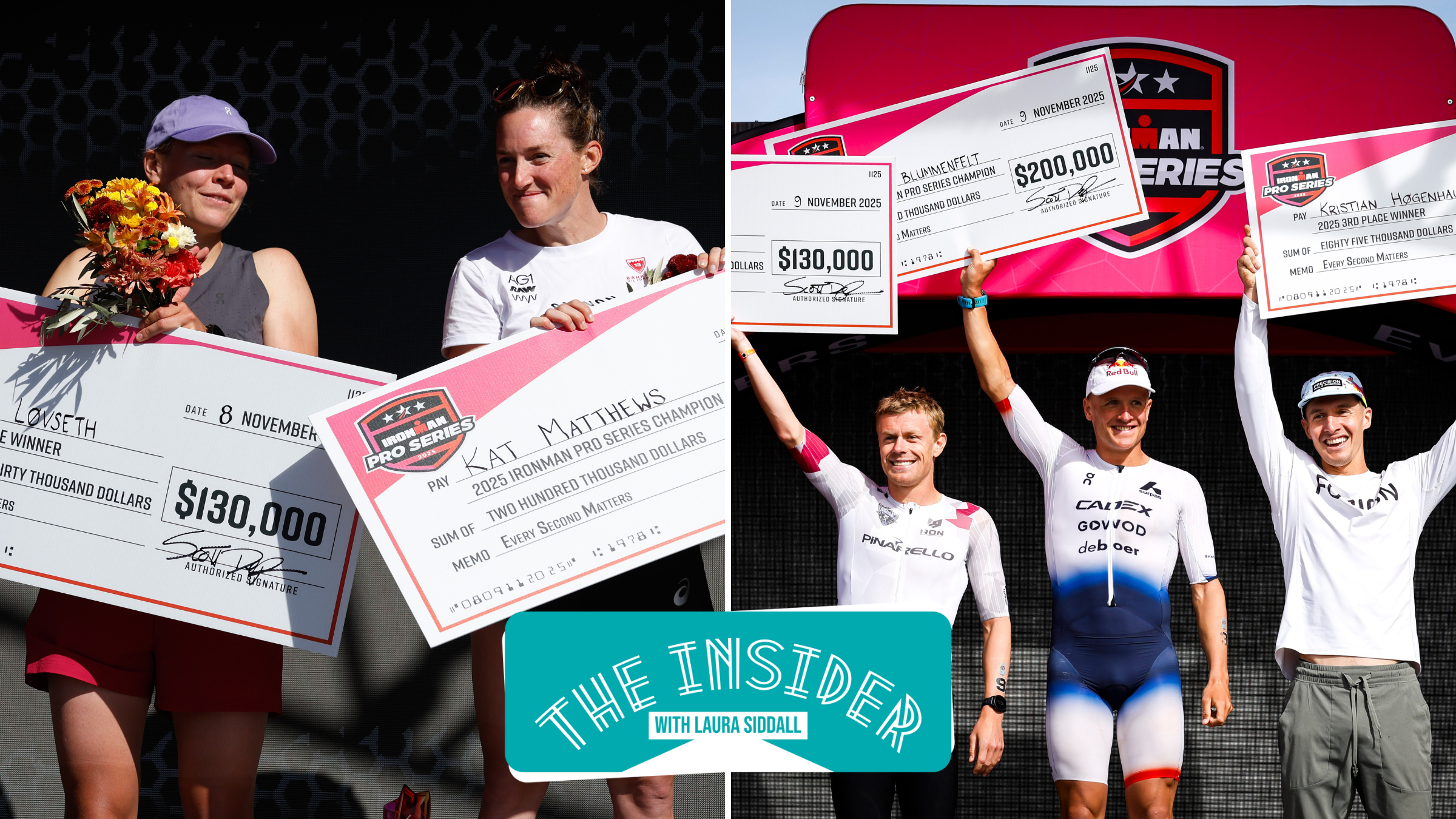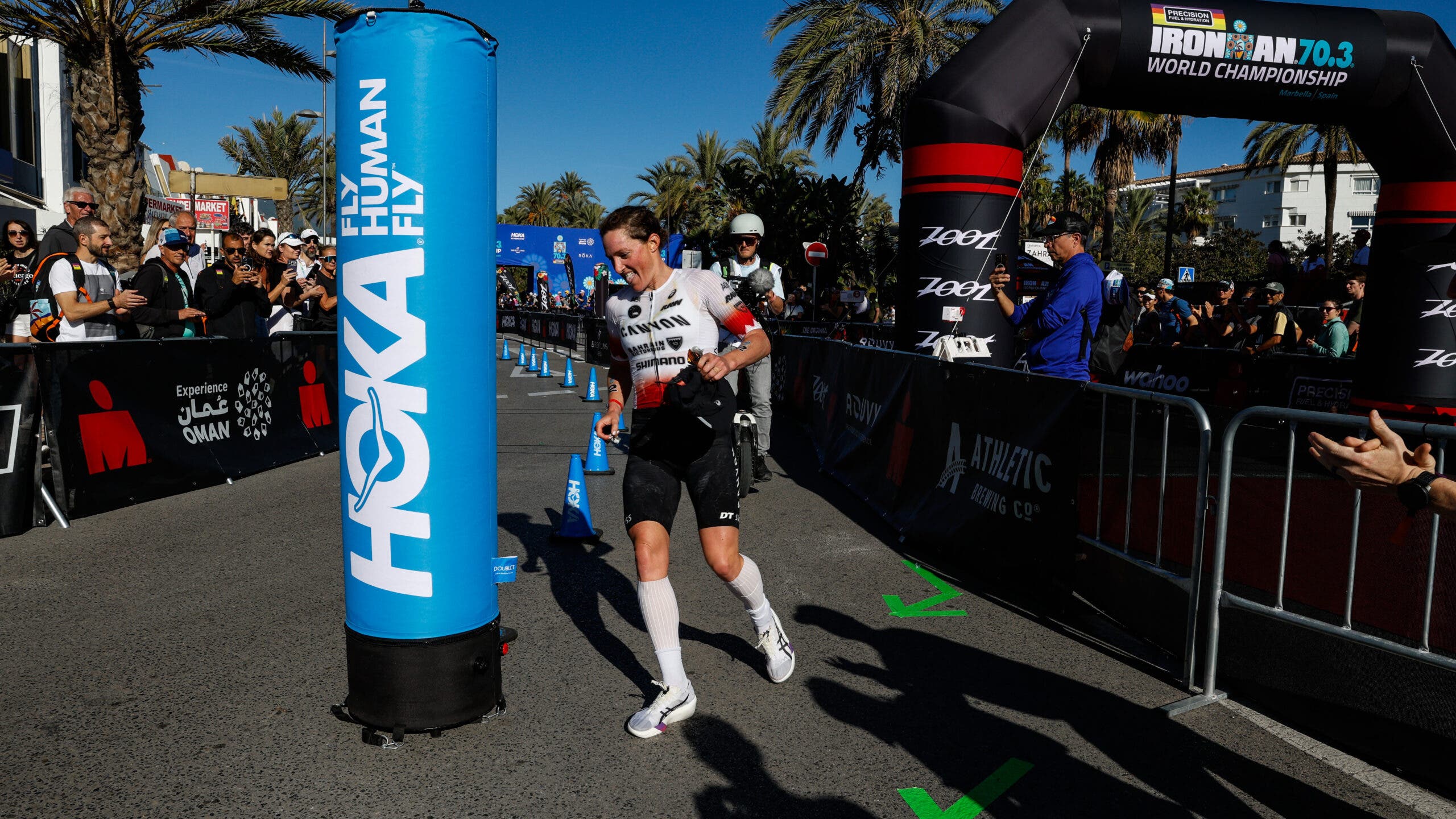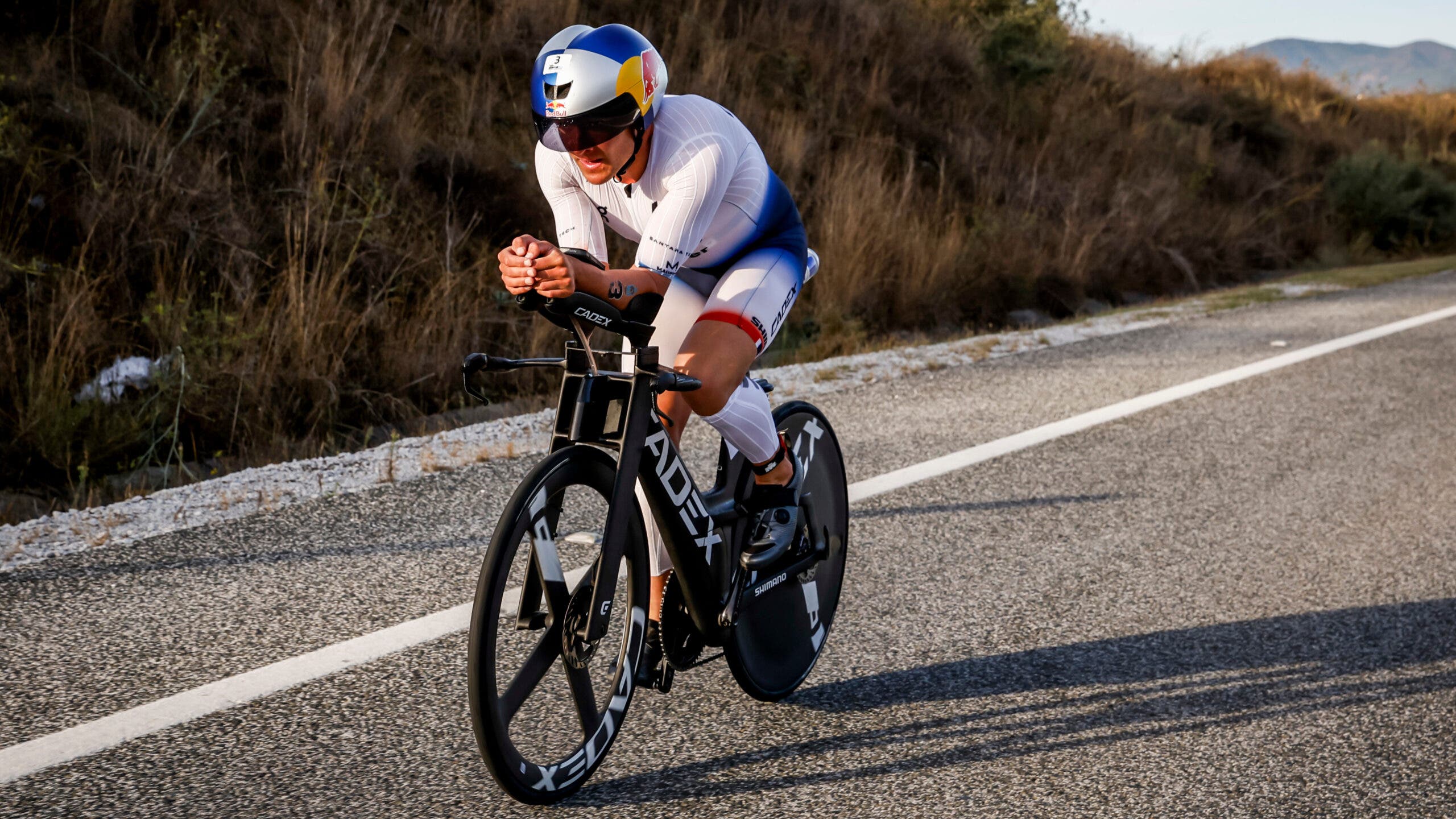These Triathletes Took Home $1.7 Million in 2025 Ironman Pro Series Prize Money

Laura Siddall breaks down who won the 2025 Ironman Pro Series with its $1.7 million purse. (Photo: Ironman)
Well, that’s it. The races are done. The points are in, and we have four champions across the Ironman and 70.3 events, and two Ironman Pro Series Champions.
The Ironman Pro Series consisted of 18 races at 17 events globally. Athletes’ top five results would count toward the series, with a maximum of three Ironman races allowed. Ironman races were 5,000 points for the win, while 70.3 races maxed at 2,500 points.
For the Ironman World Championship, athletes could earn 6,000 points for the win, and for the Ironman 70.3 World Championship, 3,000 points. For every second after the winner had crossed the line, 1 point would be deducted from those who placed lower.
At the end of the year, the top 10 ranked athletes shared the $1.7 million prize pool, the winner taking home $200,000, and 10th place earning $10,000. 11-15th each took $8,000, 16th-20th $6,000, 21st -30th $5,500, 31st-40th $4,500 and 41st-50th $3,000 each.
Therefore, there were still places and points to play for right up to the last race of the series.
Ironman Pro Series women’s results

The women’s race in Marbella looked like it was going to be as dramatic as Kona. Similar style too, as Lucy Charles-Barclay (GBR) and Taylor Knibb (USA) charged at the front of the race, with just under a four-minute lead to Kat Matthews (GBR) at the start of the run.
Matthews set off on a tear, eating up the road in rapid fashion. Until her calf gave out, and sadly for Matthews, her day was over. A bitter pill for Matthews as another world title escapes from her grasp.
However, it was redemption for Charles-Barclay in an almost perfect race, running to take her second Ironman 70.3 World Championship title. Knibb was second. Not necessarily a familiar place for Knibb, nor one that she will like, but one that will only fuel her desire and determination for 2026.
It was an impressive performance by Charles-Barclay and Knibb, who both just four weeks earlier in Kona, failed to finish, succumbing to the heat. For Knibb, she only got the go-ahead to race on Friday, seven days out from the race, and had done limited training since Kona, ensuring rest and recovery were priority.
At the press conference, Knibb explained that for the first few days after Kona, she was barely awake for three hours at a time.
The race was an impressive display of ability, talent, hard work, determination, and teamwork for both Charles-Barclay and Knibb.
In third was World Triathlon Championship Series athlete German Tanja Neubert, showing she’s one to watch in the future, should she wish to move fully to middle distance, after the 2028 Los Angeles Olympics.
Georgia Taylor-Brown (GBR) finished in fourth, Marjolaine Pierre (FRA) in fifth. The Ironman World Champion, Solveig Lovseth (NOR), was a very respectable sixth after what I’m sure was a whirlwind of days after Kona. Jess Learmonth (GBR), seventh, Lizzie Raynor (GBR) eighth, Hanne De Vet (BEL) ninth, and Ellie Salthouse (AUS) rounding out the top 10. Four British women were in the top 10.
Before the race, there were a great deal of math calculations of what Matthews needed to win the overall Ironman Pro Series, and what Løvseth needed. These two were the only two in the running for the series win. Lisa Perterer was secure in third. No one below would catch her, but she also couldn’t catch the leading duo.
At the start of the run, it was looking pretty secure that Matthews would take the title until she stopped and pulled out of the race. Now the math started again.
For Løvseth to win the series, she had to finish six minutes and 40 seconds ahead of Matthews, and within 1 minute and 40 seconds of the winner. With Matthews now a DNF, could Løvseth run herself up to within 1 minute and 40 seconds of the leader?
Løvseth started the run 7 minutes and 50 seconds down from the lead, and so it would be a big ask for her to erase that deficit, and so tough for her to win the series, regardless of Matthews’ finish. In the end, the gap was too big and Matthews took the series title for the second consecutive year and $200,000 in prize money.
In fact, there was no change in the top five rankings. Matthews (20,845 points, earning $200,000), Løvseth (20,351 points, earning $130,000), Perterer (17,956 points, earning $85,000), American Jackie Hering (16,330 points, earning $70,000), and German Laura Jansen (14,961 points, earning $50,000). Funnily, Løvseth won more in prize money for finishing second in the Ironman Pro Series ($130,000) than for becoming the Ironman World Champion ($125,000).
However, there were some gains for athletes who raced in Marbella and scored enough to move them into the top 10. Regan Hollioake (AUS) finished 29th in Marbella, but it was enough to move her up one place to finish sixth in the series (14,852 points for $40,000).
This dropped Anne Reischmann (DEU) down one place to seventh. Reischmann didn’t race in Marbella and completed (rather than competed) in Kona, following the announcement of her pregnancy. So, a wonderful result regardless for Reischmann and her husband, Joel.
Danielle Lewis (USA) finished 26th in Marbella, and while she probably isn’t happy with that result, it moved her up two places to eighth in the series (12,669 points, earning $29,000).
Hannah Berry (NZL), who was fourth at the Ironman World Championship, chose not to race, and dropped to ninth but remained in the top 10. Berry was the only athlete in the top 10 who had just three races scoring in her total, compared to everyone else who had at least four, but most had all five.
Maja Stage Nielsen (DNK), finishing in 28th in Marbella, put herself into the top 10 (12,075 points, earning $10,000).
Further down, Charlene Clavel (FRA), Sara Svensk (SWE), and Katrine Graesboll Christensen (DNK) moved into the top 15, securing an extra $2,000 in prize money.
Women’s 2025 Ironman Pro Series final standings
| Place | Athlete | Points |
| 1 | Kat Matthews (GBR) | 20,845 |
| 2 | Solveig Løvseth (NOR) | 20,351 |
| 3 | Lisa Perterer (AUT) | 17,956 |
| 4 | Jackie Hering (USA) | 16,330 |
| 5 | Laura Jansen (DEU) | 14,961 |
| 6 | Regan Hollioake (AUS) | 14,852 |
| 7 | Anne Reischmann (DEU) | 14,587 |
| 8 | Danielle Lewis (USA) | 12,669 |
| 9 | Hannah Berry (NZL) | 12,157 |
| 10 | Maja Stage Nielsen (DNK) | 12,075 |
Ironman Pro Series men’s results

The men’s race the following day had just as much action and drama, and one of the closest finishes in Ironman history, as defending champion Jelle Geens (BEL) managed to edge out Kristian Blummenfelt (NOR) in a sprint finish.
The 2025 Ironman Champion, Casper Stornes (NOR), ran much as he did in Nice, letting the front guys set the pace, and building pace, coming through in the second half, to take third, a minute behind Geens.
Much like the women’s race, Blummenfelt was pretty much secure to take the Ironman Pro Series overall title. He was ranked No. 1 going into the 70.3 World Championship, with Stornes, the only athlete who could potentially challenge him for that top spot.
If Blummenfelt stayed ahead of Stornes and within 12 minutes and 9 seconds of the winner, Blummenfelt would take the Pro Series title. Since he finished second, just three seconds behind the winner, but ahead of Stornes, the title was his.
Blummentfelt scored 21,200 points but, more importantly, earned the $200,000 check. Stornes did enough to finish in second (20,414 points, earning $130,000, $5,000 more than his prize money for winning the Ironman World Championship).
Heading into Marbella, Gustav Iden (NOR) had been sitting in third in the overall series, but with finishing 36th, and 17 minutes and 26 seconds off the front, Iden dropped to fifth (18,145 points, earning $50,000).
Kristian Høgenhaug (DEN) and Nick Thompson (AUS) did enough in Marbella, finishing in 21st and 16th, respectively, to move ahead of Iden into third (Høgenhaug, 18,530 points, earning $85,000) and fourth (Thompson, 18,415 points, earning $70,000)
Rudy von Berg (USA), Jonas Schomburg (DEU), and Henrik Goesch (FIN) were the other big scorers from Marbella, as their results ensured they moved into the top 10 in the overall series, a significant jump in prize money.
Von Berg, I’m sure, won’t have been happy with his 20th in Marbella, but it was enough to move him up four places to finish in sixth (17,753 points, earning $40,000).
Schomburg, another fantastic result for this athlete who moved up from the Olympic distance racing this year, and finished sixth in the Ironman World Championship on debut, added a fourth place in Marbella to jump him up six places to seventh (17,173, earning $30,000).
Schomburg was also the only athlete in the top 10 to use only the scores of two Ironman races, compared to everyone else’s three.)
Goesch only finished in 41st in Marbella but was able to move up four places to finish in eighth (16,954, earning $20,000).
This knocked Leon Chevalier (FRA) and Jonas Hoffmann (GER) down to ninth and 10th. Neither of these athletes raced in Marbella, chancing their luck and just keeping their spots in the top 10.
Those that weren’t so lucky were Matthew Marquardt (USA) and Cameron Wurf (AUS), who, with not racing, dropped out of the top 10 to finish in 11th and 13th, respectively.
Jamie Riddle (ZAF) with another top 10 in the World Championship races, 10th in Nice, and now seventh in Marbella, meant he moved up three spots into 14th and a higher pay bracket ($8,000).
| Place | Athlete | Points |
| 1 | Kristian Blummenfelt (NOR) | 21,200 |
| 2 | Casper Stornes (NOR) | 20,414 |
| 3 | Kristian Høgenhaug (DNK) | 18,530 |
| 4 | Nick Thompson (AUS) | 18,415 |
| 5 | Gustav Iden (NOR) | 18,145 |
| 6 | Rudy von Berg (USA) | 17,753 |
| 7 | Jonas Schomburg (DEU) | 17,173 |
| 8 | Henrik Goesch (FIN) | 16,954 |
| 9 | Leon Chevalier (FRA) | 16,553 |
| 10 | Jonas Hoffmann (DEU) | 16,345 |
Wrapping up the 2025 Ironman Pro Series
It was a successful season for the second year of the Ironman Pro Series. It seems to catch the attention of the pros and supports the athletes racing over the full distance.
Matthews proves herself as the consistent high performer, taking her second series title, while Blummenfelt delivers big wins early in the year, with podium finishes at the world championships to take the men’s series.
Perhaps it’s fitting that Matthews and Blummenfelt won the Ironman Pro Series in 2025. A year in which they didn’t manage to secure a world title. Matthews finished second (again) at the Ironman World Championship, yet to have her day on the top step. Blummenfelt had a second and third, but was unable to take a win as he has done in previous years.
Both Matthews and Blummenfelt deserved to be the winners of the series. Consistently delivering the highest performances over the year, and while they were unable to take the tape in Nice, Kona, or Marbella, they are still champions.
The 2026 Ironman Pro Series will kick off on March 7 with Ironman New Zealand, and will run through until October 10 at the Ironman World Championship in Kona. Sixteen locations, 17 events, which sounds like a reduced race schedule, but this is just because Ironman is returning to one day of racing in Kona for the world championship.